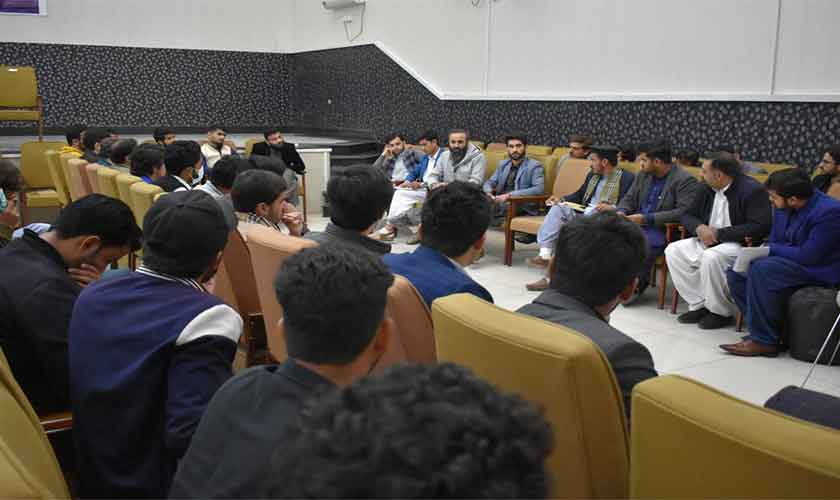or longer than a decade Peshawar has been shivering under the shadow of fear and pain. Nevertheless, some rays of hope keep the terrified citizens of this historic metropolis alive.
The Peshawar Circle is a civil society initiative that holds a book discussion every month. The venue is a hall at the Archives Library in Peshawar, quite close to the Police Lines, the target of a horrific attack a couple of months ago.
“Are you not worried about holding such gatherings in the face of this rising militancy?” I ask Shafeeq Gigyani, the organiser, a lecturer in public policy. “We started the Peshawar Circle back in 2020,” he says, “so far, we have not missed a single session, not even in the face of security concerns. This was the 26th session. This means that we have read and discussed 26 books so far.”
Gigyani says the group used to hold these sessions at a book café called Books and Chai. However, the book café had to pull down its shutters due to the dramatic rise in expenses and the steep fall in book sales.
For this week’s session of the Circle, the title under discussion was Mohsin Hamid’s The Reluctant Fundamentalist, a post-9/11 novel that vividly depicts the dilemmas of cultural hybridity for non-white immigrants in America and how it ultimately causes these immigrants to experience identity crises. Hamid explores these issues through the eyes of the novel’s protagonist, Chengez, a Muslim and a non-white immigrant to America.
Dr Faizullah Jan, a professor in the Department of Communication Studies at the University of Peshawar, was the chief guest. There could hardly be a better speaker than Dr Jan for the subject at hand.
Dr Jan has a PhD from the USA. His research interests include the intersection of extremist media, religion and cultural studies; discourse and narrative analysis; language, power and identity; militancy, extremism and journalism in the age of post-truth; and critical and cultural studies.
Building his argument on the ideas of the French literary critic and theorist Roland Barthes, presented in his 1967 essay, The Death of the Author, Prof Jan spoke at length about race and identity. He touched upon several human and social sciences to deconstruct the concept.
“Anthropologically speaking, there is only one race in the world – that is the human race,” Dr Jan emphasised, switching smoothly between Urdu and English. “All other races are social constructs,” he continued.
Individual, collective, interpersonal and intergroup identities are all possible. All of us carry multiple identities at the same time, i.e., the identities of gender, language, ethnicity, religion, village or country etc. However, identities aren’t static; they change with time.
Prof Jan said the races had been ‘constructed’ for various purposes. Next, those races either adopted specific identities or had identities thrust upon them. More often than not, the reasons were material and economic rather than social or religious.
Individual, collective, interpersonal or intergroup identities are all possible. All of us carry multiple identities at the same time, i.e., the identity of gender, language, ethnicity, religion, village or country etc. The identities aren’t static; they change with time.
Prof Jan mentioned that conflict was a source of change and was desirable except when it became violent. He referred to the racial conflict between the Hutu ethnic majority and the Tutsi minority in Rwanda, also known as the Rwandan genocide – in which more than a million people perished.
Contrary to the common perception, economic issues, not religious or cultural ones, led to the division between Hutus and Tutsis. People who tended animals were known as Tutsis, while those who farmed crops were known as Hutus. Hutus made up the larger part of the population of Rwanda. These distinctions between classes were eventually perceived as racial labels.
Iftikhar Hussain Tajik, a PhD student, asked whether the Taliban’s ban on girls’ education was motivated by culture or religion.
Dr Jan responded to the question by saying that the Taliban were not representative of Pashtuns or Afghaniyya. He said the Taliban have been trying to change the Pashtun identity by changing cultural symbols and labels and creating a new discourse based on their own needs and aspirations.
Prof Jan’s deliberation upon the topic was peppered with allusions and references to scholars in multiple disciplines including Carl Jung, Sigmund Freud, Mubarak Ali, Michael Foucault, Dostoevsky and David Harvey.
The critical comments and analysis of other members of the club were no less valuable. The discussion showed their enthusiasm for knowledge and raised hopes for a bright future. The proposed title for the next session is Orientalism by Edward Saeed.
The writer has studied English literature, history, politics and education. He can be reached at nadeemkhankpk13 @gmail.com and tweets @nadeemkwrites
https://www.thenews.com.pk/tns/detail/1079057-read-discuss-repeat

